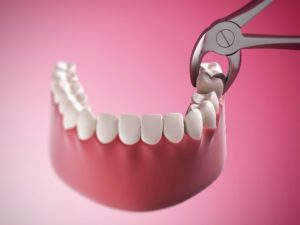 According to the Centers for Disease Control and Prevention, 50% of adults have gum disease. Although it is preventable, it is a leading cause of tooth loss. It can be treated during the earliest stage, but with no intervention, it can have devastating consequences for your smile. If you have advanced gum disease, you might think extracting your teeth will stop the infection, but it’s not the solution you’re looking for. Here’s what you need to know before removing your teeth.
According to the Centers for Disease Control and Prevention, 50% of adults have gum disease. Although it is preventable, it is a leading cause of tooth loss. It can be treated during the earliest stage, but with no intervention, it can have devastating consequences for your smile. If you have advanced gum disease, you might think extracting your teeth will stop the infection, but it’s not the solution you’re looking for. Here’s what you need to know before removing your teeth.
What is Gum Disease?
Gum disease is an infection caused by bacteria found in plaque and tartar buildup from poor oral hygiene habits. Gingivitis is the earliest stage of the infection, which causes red, swollen, and bleeding gums. At this point, a good cleaning and changes to your home oral hygiene routine are enough to stop the infection.
Unfortunately, most people don’t recognize the early signs of gum disease. If it reaches advanced stages from no treatment, it will destroy the supporting structures of your teeth and underlying bone. This can ultimately lead to tooth loss, but that’s not the only concern.
Gum disease is also linked to several health issues, including cardiovascular disease, Alzheimer’s disease, and diabetic complications. Treating the infection it’s crucial to protect your oral health and general wellness.
Gum Disease and Extractions
It’s a common belief that extractions will eliminate the problem at the source, but removing your teeth doesn’t treat or cure gum disease. Every tooth is invaluable for your oral health and functions, which is why your dentist will always try non-surgical options before recommending extractions. There are many less invasive solutions, like antibiotic therapy or a deep cleaning.
However, if the infection is severe, and your teeth are too badly damaged, your dentist may recommend having them removed. The risk of infections is reduced if the teeth are removed professionally instead of waiting for them to fall out.
After your teeth are removed and adequate healing has occurred, they’ll discuss your options to replace your lost teeth. Your gums must be healthy before moving forward with any tooth replacement treatment, like a bridge, dentures, or dental implants.
You must commit to your oral health to ensure the infection does not reoccur, like brushing, flossing, and visiting your dentist every 6 months for a cleaning and checkup. Your dentist may recommend more frequent appointments to ensure the infection has been resolved.
Don’t wait for gum disease to cause irreversible damage to your smile. Contact your dentist at the first sign of an infection. The earlier it is treated, the better it is for your mouth and body.
About Dr. Alan Diep
Dr. Diep earned his dental degree from the Lake Erie College of Osteopathic Medicine, School of Dental Medicine, and has regularly continued his education in many specialties, like gum disease therapy. If you have advanced gum disease, call our office at (805) 215-0123 to schedule an appointment.
